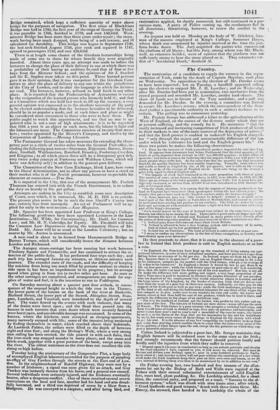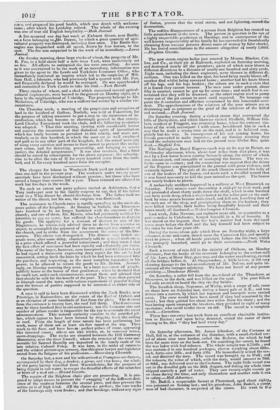Cbc exuntrv.
The nomination of a candidate to supply the vacancy in the representation of York, made by the death of Captain Bayntun, took place on Wednesday. No opposition to the election of Mr. Dundas seems to have been expected; but on Tuesday, a handbill appeared calling upon the electors to support Mr. J. H. Lou-then; and on Wednesday, after Mr. Dundas had been put in nomination, two mechanics from the crowd proposed and seconded Mr. Lowther, amidst loud cheers. The show of hands was in favour of the Tory candidate, and a poll was demanded for Mn. Dundas. In the evening, a committee was formed to secure Mr. Lowther's return ; which the correspondent of the Sunsdard (rather a questionable authority in such a matter) declares to be certain. The polling was to commence yesterday.
Mr. Poulett Scrope has addressed a letter to the agriculturists of the West of England, on the causes of the distress under which they are at present suffering, and the remedy for it. He maintains " that the vastly increased and increasing competition of Irish produce of all kinds in their markets is one of the main sources of the depression of prices and that the Irish grower is enabled to undersell his English competitor "only through the unjust and unwarrantable difference of the law under winch he cultivates his land and the English grower his." On these two points he makes the following observations.
I. First, for the increase of Irish agricultural produce imported for sale into England. It appears from documents laid before Parliament that the total quantity of alt kinds of grain imported from Ireland in 1317 was 699,809 quarters, iii 1832, 2,605,734 quarters ; and there is reason for believing that the imports of this year will prove to be much greater those atilt: last. At the same time that the quantity has thus increased fourfold. the quality likewise has been rapidly improving, Formerly, Irish wheat wss not worth as much as English by 15s. or 16s. per quarter, now it sells on the avenge. within 4s. or Sc. of the average of English wheat. Irish oats bring ou the average price fully equal to that of English oats.
" The imports of stock have increased in the same proportion with those of gra,.o. The number of cows, swine, horses, and sheep, in 1817, were 100,204; in 1355, 20#.7. There are no returns or the total quantity imported since 1885; but it must have prodigiensly increased, as no less than 418,000 head were introduced in 1831 through the pert of Liverpool alone.
"On the whole, therefore, it is certain that the imports of farming produce from Ireland to England have been more than quadrupled within the last sixteen years. Nei wonder that prices have sunk in the English markets under the increased supply ! " 2. Some, however, may say, ' tins cannot he helped ! Ireland is as much an integral part of the British empire as Yorkshire or Berwickshire, arid cannot in justice be prevented from sending her produce to our markets. The Irish are under the same laws and government with ourselves, and have a right to a free intercourse with every part of the King's dominions.' "Such would inject he the Case if Ireland were subject to the same lawsae, Greet Britain, but this is by no means the fact. There exists a great andmost important ditre. rence between the laws of Ireland and England in many points which directly afftxt the prices of their respective produceThe most material of these distinctions are, that " 1. Ireland pays fewer Government taxes than Great Britain. i " 2. Ireland s allowed to have a free banking system and a currency of 1/, notes both of which are by law prohibited in England. "3. Ireland has no Poordaws. The land of Ireland is cultivated free or poor-rate. "1 mean to confine my observations to the last of these exemptions, as bearing most immediately upon your interests."
4He then proceeds to show, that it is owing to the absence of law in Ireland that Irish produce is sold in English markets at so low a rate.
In England, the Poordaws have kept up the standard of living among our agricultural labourers, in spite of their redundant numbers, and have prevented wages frose falling below an average of Is. 6d. per day. In Ireland, wages are from 4d. to 10d. per rt3, because there is no poor-law I How can an English farmer, pitying Is. bd. a-day to his labourers, compete in the market with the Irish farmer, who pa.,s an average of 7d. a-day to his labourers? In England a farmer is forced by law to pay from 3s to lOs an acre poor-rate ; while the Irish farmer pays no poor-rate at all! Is it wonderful. then, that the latter can beat the former out of his own markets? But this is not an_ To make the difference still more galling and unjust, a very large proportion of our heavy Poor-rates is paid to maintain in idleness the surplus labourers of our parishes, who are deprived of the employment they would otherwise obtain in London, and all the large towns of the kingdom, by the hordes of starving Irish that are driven over here from the want of a poor-law in their own country. Indirectly, we thus pay fur the support of the Irish poor as well as our own; while the Irish landowner, paying no tax of the kind at all, and hiring his half-famished labourers for one-third (erne wages tire law compels ns to give, sends over to our markets his corn and cattle, his butter aril
bacon, raised at less than half tine cost st of our produce,
ce, which has to meet t there, and
pockets the difference in the shape of an exorbitant rent.
" For it is the landlord of Ireland, not the farmer, who profits by this unfair and en: just state of the law. The farmers of Ireland are mere slaves—worse off than the serfs of Russia. Hie Irish flirmer is a poor creature who occupies a wretched Rideable, and from 2 to 20 acres of land, is clothed in rags, lives only on potatoes and buttermilk, and never tastes from year's end to year's end a mouthful of the corn he raises, itire hatte.r he mak,,s, or the bacon of the hogs that are his messmates by day and his bedfellows by night, but sends every ounce of these things to England for the money with whicb to pay his rent. It is the absence of any law compelling the landholders to keep their pea,ratry from starving, which enables them to exact from the latter every atom of the of the produce of their labour upon the soil, except the dry potatoes on which they support a miserable existence."
Unless Ireland is subjected to a poor-law, Mr. Scrope maintains Olaf; English farmers will be reduced soon to the same state as the Irish; and strongly recommends that the former should petition loudly and boldly until the injustice from which they suffer is removed.
" Depend upon it (he says in conclusion) so long as yetis submit patiently and silently to the cruel injustice I have exposed to you, it will never be removed. But meet to • discuss and declare your feelings upon it ; pour in some hundred petitions to Parliament about it ; and another session will not pass without the enactment of a use which shall make the Irish landlords keep their poor on their own corn and bacon, as we de ours, instead of driving them over here to be maintained by us in addition to our own."
On Friday evening last, two hundred and five tenants of the allotments let out by the Bishop of Bath and Wells were regaled at the Palace with their annual substantial entertainment of solid English fare, roast beef, plum pudding, &e. His Lordship attended, for a short time, the convivial party, and proposed as a toast, "Success to the allotment system," which was drunk with nine times nine; after which, "Good landlords and good tenants," drunk with three times three. Mr. Emery, the steward, then handed to his Lordship the whole of the tens, and proposed his good health, which was drunk with acclamations; after which his Lordship retired. The whole of the evening was one of true old English hosiptality.—Bath Journal. ' A fire occurred one day last week at Ewhurst Green, near Battle, on a farm belonging toaMr. Dawes, by which a great quantity of agri cultural property was destroyed, including four oxen. The Battle fireengine was despatched with all speed, drawn by four horses, to the spot. The fire was suspected to be the work of an incendiary.—Lewes Journal.
On Sunday morning, three large stacks of wheat, the property of Mr. R. Fox, in a field about half a mile from York, were maliciously set on fire. All efforts to extinguish the fire were unavailing. As soon as it was ascertained to be the work of an incendiary, information was giyen to the agent to the Leeds and Yorkshire Insurance Office ; who
immediately instituted an inquiry which led to the suspicion of William Hall, a labourer, who had previously had a quarrel with Mr. Fox, and frequently declared he would be revenged. He was apprehended and committed to York Castle to take his trial.— York Herald.
Three stacks of wheat, and a shed which contained several agriculcultural implements, were burned to the ground on Monday night, on a fawn in the neighbourhood of Uxbridge. The property belongs to Mr. Nicholson, of Uxbridge, who was a sufferer last winter by a similar circumstance.
On Thursday week, a meeting of the proprietors and occupiers of land in the hundred of Gallow, Norfolk, was held at Fakenham, for the purpose of taking measures to put a stop to the recurrence of in cendiarism, which has become so alarmingly general in that county. Lord Charles Townshend took the chair, and the following resolution
was adopted. " That this meeting, viewing with considerable horror
and concern the recurrence of that diabolical spirit of ineendiarism which has lately become so prevalent in this county, and more par ticularly so in this hundred, in which the poor are as well employed
and paid as in any other part of the kingdom, feel the actual necessity of using every exertion and means in their power to prevent this malig
nant crime, and for detecting, prosecuting, and bringing to severe justice, the deluded perpetrators." It was also resolved, that a fund should be raised by subscription for the above purposes: the subscription to he after the rate of 1/. for every hundred acres from the landlord, and 1/. for every hundred acres from the occupier.





















 Previous page
Previous page